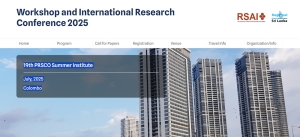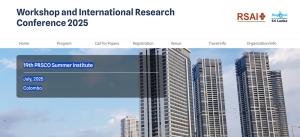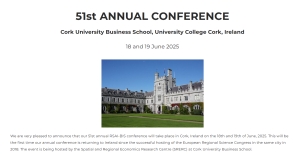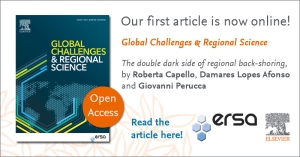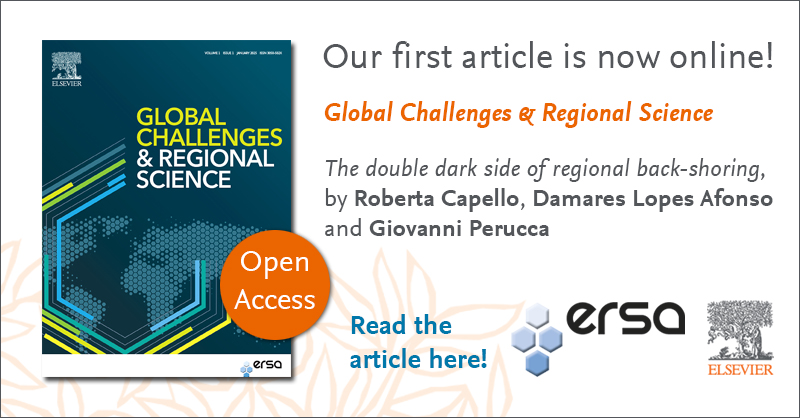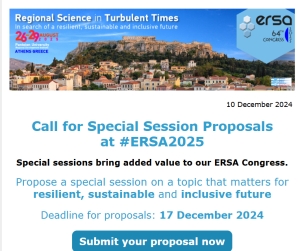RSPP Special Issue Award
Elisabete Martins
Call for Submissions | PRSCO Award for Best Paper by a Young Regional Scientist 2025
Call for Submissions, PRSCO Award for Best Paper by a Young Regional Scientist 2025.
The Pacific Regional Science Conference Organization (PRSCO) offers a Best Paper Award annually. The Award is aimed at encouraging young regional scientists within the Asia-Pacific region to participate in research within the PRSCO community and to achieve research excellence. PRSCO now invites submissions for the 2025 Award.
The Award will be made for the best submission to the PRSCO Best Paper competition by a young regional scientist, under the age of 35 (on December 31, 2025), who is from a PRSCO-relevant part of the world.
The Award rules can be found on the PRSCO web site.
Papers submitted for the Best Paper Award should be presented to the 19th PRSCO Summer Institute in 2025 at Colombo on July 24-25, 2025.
The LOC of the PRSCO 2025 will waive the registration fee for the Prize winner.
Eligible authors who wish to submit a paper to the PRSCO Best Paper competition should email a pdf copy of their paper to the PRSCO Executive Secretary, Soushi Suzuki, This email address is being protected from spambots. You need JavaScript enabled to view it., by no later than May 31, 2025.
Papers will be assessed by a PRSCO Best Paper Selection Committee and the author of the winning paper is expected to be notified by July 10, 2025. The decision of the Selection Committee will be final.
More information: http://www.lst.hokkai-s-u.ac.jp/~soushi-s/prsco/PRSCOAwards.html#Young
Call for Abstracts | 19th PRSCO Summer Institute in 2025. Renuka City Hotel, Colombo, Sri Lanka, July 24–25, 2025
Call for Abstracts, The 19th PRSCO Summer Institute in 2025.
Renuka City Hotel, Colombo, Sri Lanka, July 24–25, 2025.
Key dates
December 1, 2024: Abstract submission opening
March 31, 2025: Abstract submission deadline
April 30, 2025: Notification of abstract acceptance
May 1, 2025: Early bird registration open
May 31, 2025: Early bird registration end
July 24 and 25, 2025: Conference
More information: https://regionalsciencesl.lk/
Call for Abstracts | 51st RSAI-BIS Conference, 18-19 June 2025, Cork, Ireland
Annual Conference 2025 Call for Abstracts
The call for abstracts for the 51st Regional Science Association International - British and Irish Section (RSAI-BIS) in Cork in June 2025 is now open. There is also further information on the conference and venue, including key dates, travel, and accommodation, available here.
The conference will take place on June 18 and 19, 2025 and being hosted by the Spatial and Regional Economics Research Centre at Cork University Business School.
The deadline for abstract submissions is February 28, 2025.
We hope you will join us in Cork for a stimulating and fun conference.
Early Career and PhD Colloquium
The Section's annual early career and PhD colloquium has again proved very attractive and over 25 papers will be presented at the online event on January 23 and 24, 2025.
We welcome all researchers to attend virtually and provide feedback on the papers. If you would like to receive log on details for the sessions, please email the colloquium organiser, Daragh O'Leary (This email address is being protected from spambots. You need JavaScript enabled to view it.). More information on the event is available here.
New issue of the Romanian Journal of Regional Science, Vol.18, No.2, Winter, Issued December 2024 now available!
Vol.18, No.2, Winter, Issued December 2024
All articles are downloadable
A mathematical model for population distribution II: Linear systems ● pp. 1-34
by Nicholas Elias, Democritus University of Thrace, Greece
Lagging regions in the U.S. are thriving in the post-COVID-19 era: Nice but why? ● pp. 35-44
by Amitrajeet A. Batabyal, Rochester Institute of Technology, United States
by Barbara Martini, University of Rome Tor Vergata, Italy
BOOK REVIEW
Ugo Fratesi, Regional Policy: Theory and Practice, Routledge, 2023 ● pp. 61-64
by Silvia Cerisola, Politecnico di Milano, Italy
Two vacancies for postdocs at the Joint Research Centre of the European Commission
Job opportunity description
Quantitative Policy Analyst on Indicator Frameworks
The current vacancy is with the Unit “Science for Modelling, Monitoring and Evaluation” of the Directorate for Innovation in Science and Policymaking.
The unit's activities help informing the conception, development and implementation of EU policies at national and local levels thanks to sound quantitative evidence and insights provided by statistical and econometric analysis, modelling solutions and monitoring frameworks based on composite indicators and scoreboards.
We offer two positions as Quantitative Policy Analysts in the Unit, and in particular in the team “Competence Centre on Composite Indicators and Scoreboards (CC-COIN),” to work on projects related to using data for constructing composite indicators and scoreboards, monitoring multidimensional phenomena and understanding their drivers and policy implications. We work on projects with high policy relevance, within a multidisciplinary team and a friendly, stimulating and efficient working environment, with strong emphasis on inclusiveness, diversity, collaboration and teamwork.
For further information, please consult the vacancy notice.
Postdoctoral Researcher in Sustainability Economics, ETH Zurich, Switzerland
Postdoctoral Researcher in Sustainability Economics
The Sustainability Economics Group, led by Prof. Dr. Moritz Drupp, seeks to inform and support the transition to sustainable futures. We investigate how society can manage natural and human-made resources not only efficiently but also equitably. Research foci in the group include (i) studying the efficacy and distributional effects of environmental policies, (ii) exploring concepts of intergenerational justice, such as applied to estimating the social cost of carbon, (iii) analysing preferences and sustainability-relevant behaviours, and (iv) accounting for the limited substitutability of nature when measuring and managing sustainable development. We draw on a diversity of methods (theory, modelling, surveys, experiments, quasi-experimental designs), often in international, interdisciplinary and transdisciplinary cooperation, and publish our work in general economics journals (e.g. American Economic Journal: Economic Policy, Journal of Economic Literature), field journals (e.g. JEEM), and interdisciplinary journals (e.g. Nature Climate Change, PNAS, Science). With our teaching, we seek to stir students’ enthusiasm for the possibilities in which economic theories and empirical methods can help to better understand and manage sustainability challenges. We furthermore actively contribute to the societal debate and help to improve public policy.
- Institution: ETH Zurich, Switzerland
- Details: Postdoc at ETH Zurich
Assistant Professor in Development Economics, Wageningen University
Assistant Professor in Development Economics
The Development Economics group at Wageningen University & Research invites applications for an Assistant Professor in development economics, beginning in July 2025 (or a later agreed upon date). We seek an enthusiastic and high-quality colleague, with expertise in empirical and/or theoretical development economics, to complement our team.
As Assistant Professor, you will be expected to:
- develop and implement research projects and publish in top (field) journals in economics;
- develop and teach courses, in collaboration with colleagues, and supervise PhD students and BSc and MSc theses;
- acquire funding to realize your research agenda;
- contribute to a lively, friendly, and inclusive working and learning environment.
- Institution: Wageningen University (WUR), Netherlands
- Details: Assistant Professor at WUR
Global Challenges & Regional Science | First paper published in the journal now available online!
ERSA2025 | Hurry up! Only 1 week left to propose a Special Session
|
|
|
|
|
|
|
|
Post-Doctoral position | Faculty of Economics, Administration and Accounting, University of Sao Paulo, Brazil
Post-Doctoral position
Faculty of Economics, Administration and Accounting
University of Sao Paulo, Brazil
Project: Fapesp 2024/01097-2, CCD -Centros de Ciências para o Desenvolvimento
The research project: The post-doc researcher will participate in a multidisciplinary research project involving the areas of Economics, Urban Planning, and Transport Engineering on the consequences of urban sprawl on the cities of Sao Paulo State, Brazil. The project is funded by the São Paulo State Science Foundation (FAPESP – Fundação de Amparo à Pesquisa do Estado de São Paulo) and the State Secretary of Urban Development (Secretaria de Desenvolvimento Urbano do Estado de São Paulo).
The candidate must have solid experience in territorial planning and management with an emphasis on computational modelling and spatial analysis, with knowledge of institutional governance and evaluation of public policies for urban and metropolitan development. She/he must demonstrate extensive experience in data manipulation and analysis in Geographic Information Systems (GIS).
The candidate is expected to demonstrate autonomy, leadership and technical competence for the development of integrated applied research and a strong ability to work effectively in teams from different areas within the scope of the project.
Candidates must send the following documents to the indicated e-mail address:
- Summary of their CV in the FAPESP format, as per fapesp.br/5266;
- Application letter with a brief description of their research interests and experiences.
The position is open to Brazilians and foreigners. The candidate must have concluded her/his Ph. D. program after 2019
Participation: The tasks will be developed at the University of Sao Paulo Urban and Regional Economics Lab – NEREUS (Núcleo de Economia Regional Urbana da Universidade de São Paulo), at the USP main campus in Sao Paulo. The candidate will have a workstation at the NEREUS Lab and must participate physically in all the Lab’s academic activities, such as seminars, conferences, etc.
Language: Interactions could be both in Portuguese or English, but all documentation and research material will be in Portuguese. Therefore, ability to reading in this language is a necessary condition.
Location: USP Campus, Cidade Universitária, Sao Paulo
Duration: 24 months
Remuneration: BRL 12.000,00 per month
The proposals must be sent to This email address is being protected from spambots. You need JavaScript enabled to view it. between October 20 and November 20, 2024. They must include a diploma or certificate of conclusion of a Ph. D. program, a detailed CV, and a statement of interest.
Details on the FAPESP Post-doctoral fellowships at https://fapesp.br/en/postdoc
About Us
The Regional Science Association International (RSAI), founded in 1954, is an international community of scholars interested in the regional impacts of national or global processes of economic and social change.

